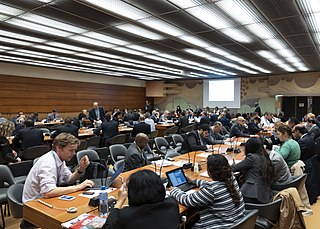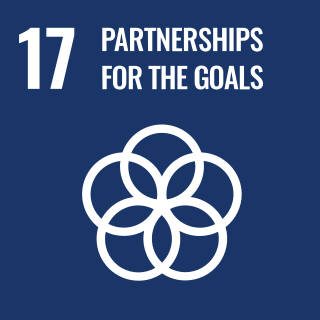Related Research Articles

The United Nations Conference on Trade and Development (UNCTAD) is an intergovernmental organization within the United Nations Secretariat that promotes the interests of developing countries in world trade. It was established in 1964 by the United Nations General Assembly (UNGA) and reports to that body and the United Nations Economic and Social Council (ECOSOC). UNCTAD is composed of 195 member states and works with nongovernmental organizations worldwide; its permanent secretariat is in Geneva, Switzerland.
A value chain is a progression of activities that a firm operating in a specific industry performs in order to deliver a valuable product to the end customer. The concept comes through business management and was first described by Michael Porter in his 1985 best-seller, Competitive Advantage: Creating and Sustaining Superior Performance.
The idea of the value chain is based on the process view of organizations, the idea of seeing a manufacturing organization as a system, made up of subsystems each with inputs, transformation processes and outputs. Inputs, transformation processes, and outputs involve the acquisition and consumption of resources – money, labour, materials, equipment, buildings, land, administration and management. How value chain activities are carried out determines costs and affects profits.

A foreign direct investment (FDI) refers to purchase of an asset in another country, such that it gives direct control to the purchaser over the asset. In other words, it is an investment in the form of a controlling ownership in a business, in real estate or in productive assets such as factories in one country by an entity based in another country. It is thus distinguished from a foreign portfolio investment or foreign indirect investment by a notion of direct control.
EMPRETEC is a United Nations programme established by the United Nations Conference on Trade and Development (UNCTAD) to promote the creation of sustainable, innovative, and internationally competitive small- and medium-sized enterprises (SMEs).
Trade in services statistics are economic statistics which detail international trade in services. They received a great deal of focus at the advent of services negotiations which took place under the Uruguay Round, which became part of the General Agreement on Trade in Services, one of the four principal pillars of the World Trade Organization (WTO) trade treaty, also called the "WTO Agreement".
Foreign affiliate trade statistics (FATS), also known as transnational corporation (TNC) data details the economic operations of foreign direct investment-based enterprises.

The Korea Development Institute (KDI) is a Korean government agency established in 1971 to conduct policy research. KDI has conducted research on a broad range of economic and social issues, including macroeconomics policy, fiscal policy, and labor.

Mahmoud Mohieldin, is an economist with more than 30 years of experience in international finance and development. He is the UN Climate Change High-Level Champion for Egypt. He is an Executive Director at the International Monetary Fund. He has been the United Nations Special Envoy on Financing the 2030 Sustainable Development Agenda since February 2020. He was the Minister of Investment of Egypt from 2004-2010, and most recently, served as the World Bank Group Senior Vice President for the 2030 Development Agenda, United Nations Relations and Partnerships. His roles at the World Bank also included Managing Director, responsible for Human Development, Sustainable Development, Poverty Reduction and Economic Management, Finance and Private Sector Development, and the World Bank Institute; World Bank President's Special Envoy on the Millennium Development Goals (MDGs), the Post-2015 Development Agenda, and Financing for Development; and Corporate Secretary and Executive Secretary to the Development Committee of the World Bank Group's Board of Governors. Dr Mohieldin also served on several Boards of Directors in the Central Bank of Egypt and the corporate sector. He was a member of the Commission on Growth and Development and was selected for the Young Global Leader of the World Economic Forum in 2005. His professional experience extends into the academic arena as a Professor of Economics and Finance at the Faculty of Economics and Political Science, Cairo University and as a Visiting Professor at several renowned Universities in Egypt, Korea, the UAE, the UK and the USA. He is a member of the International Advisory Board of Durham University Business School. He also holds leading positions in national, regional and international research centres and associations. He has authored numerous publications and articles in leading journals in the fields of economics, finance and development.
The Intergovernmental Working Group of Experts on International Standards of Accounting and Reporting (ISAR) is hosted by the United Nations Conference on Trade and Development (UNCTAD). Created in 1982 by the United Nations Economic and Social Council (ECOSOC), its mission is to facilitate investment, development and economic stability by promoting good practices in corporate transparency and accounting.

Rebeca Grynspan Mayufis is a Costa Rican economist who has been serving as Secretary General of the United Nations Conference on Trade and Development (UNCTAD) since 13 September 2021.
An international investment agreement (IIA) is a type of treaty between countries that addresses issues relevant to cross-border investments, usually for the purpose of protection, promotion and liberalization of such investments. Most IIAs cover foreign direct investment (FDI) and portfolio investment, but some exclude the latter. Countries concluding IIAs commit themselves to adhere to specific standards on the treatment of foreign investments within their territory. IIAs further define procedures for the resolution of disputes should these commitments not be met. The most common types of IIAs are bilateral investment treaties (BITs) and preferential trade and investment agreements (PTIAs). International taxation agreements and double taxation treaties (DTTs) are also considered IIAs, as taxation commonly has an important impact on foreign investment.
Multistakeholder governance is a practice of governance that employs bringing multiple stakeholders together to participate in dialogue, decision making, and implementation of responses to jointly perceived problems. The principle behind such a structure is that if enough input is provided by multiple types of actors involved in a question, the eventual consensual decision gains more legitimacy, and can be more effectively implemented than a traditional state-based response. While the evolution of multistakeholder governance is occurring principally at the international level, public-private partnerships (PPPs) are domestic analogues.

The Investment Policy Framework for Sustainable Development (IPFSD) is a dynamic document created to help governments formulate sound investment policy, especially international investment agreements (IIAs), that capitalize on foreign direct investment (FDI) for sustainable development. It was prepared by the Division on Investment and Enterprise (DIAE) of the United Nations Conference on Trade and Development (UNCTAD). IPFSD is not a negotiated text or undertaking between States; but rather an initiative by the UNCTAD Secretariat that represents expert guidance while leaving domestic policy makers free to adapt and adopt. IPFSD is the result of numerous consultations with experts and is intended as a platform to provide for further consultation and discussion with all investment stakeholders. The main objective of the IPFSD is to create a balance between the rights and obligations of States and investors while maintaining attractive investment environments.

The United Nations created 17 world development goals call the Sustainable Development Goals (SDGs). They were created in 2016 with the aim of "peace and prosperity for people and the planet, now and into the future."

The biennial World Investment Forum (WIF) is organized by the United Nations Conference on Trade and Development (UNCTAD) to promote investment for sustainable development and facilitate policy dialogue among a diverse community of investment stakeholders. The forum brings together policymakers, including Heads of State and Government, Ministers and other government officials responsible for investment; representatives from the private sector, including CEOs; international organisations working in the area of sustainable development and poverty reduction; thought leaders from academia and research institutions; and other members of the international investment community, including treaty negotiators, investment promotion and location experts, heads of sovereign wealth funds, heads of stock exchanges, and NGOs.

James X. Zhan has been Director of Investment and Enterprise at the United Nations Conference on Trade and Development (UNCTAD) since 2009. He also leads the preparation of the annual World Investment Report.
The Addis Ababa Action Agenda was the outcome of the 2015 Third International Conference on Financing for Development, held in Addis Ababa, Ethiopia. It was adopted by heads of state and government on 15 July 2015. 174 United Nations member states sent delegations; 28 heads of State, vice presidents and heads of government attended. Governments were joined by the heads of the United Nations, the International Monetary Fund (IMF), the World Bank and the World Trade Organization (WTO), prominent business and civil society leaders, and other stakeholders. The agreement is a follow-up to the 2002 Monterrey Consensus and the 2008 Doha Declaration on Financing for Development.

The Women in Business Award is a biannual award given by the United Nations Conference on Trade and Development (UNCTAD). The competition is restricted to women who have taken part in the EMPRETEC programme. It was first awarded in 2008.

Sustainable Development Goal 17 is about "partnerships for the goals." One of the 17 Sustainable Development Goals established by the United Nations in 2015, the official wording is: "Strengthen the means of implementation and revitalize the global partnership for sustainable development". SDG 17 refers to the need for the nonhegemonic and fair cross sector and cross country collaborations in pursuit of all the goals by the year 2030. It is a call for countries to align policies.
The United Nations Forum on Sustainability Standards (UNFSS) is an initiative with a steering committee of six United Nations Agencies – Food and Agriculture Organization (FAO), International Trade Centre (ITC), UN Environment, UN Industrial Development Organization (UNIDO), United Nations Economic Commission for Europe (UNECE), and the UN Conference on Trade and Development (UNCTAD) is the secretariat of UNFSS. UNFSS headquarters are in Geneva.
References
- ↑ "Investment Policy Monitor". Archived from the original on 2013-10-14. Retrieved 2013-07-30.
- ↑ "Unctad.org | Global Investment Trends Monitor". Archived from the original on 2013-06-25. Retrieved 2013-07-30.
- ↑ "Unctad.org | International Investment Agreements (IIAs)". Archived from the original on 2013-07-20. Retrieved 2013-07-30.
- ↑ "Investment Policy Reviews | UNCTAD".
- ↑ "Unctad.org | Investment Facilitation Compact". Archived from the original on 2013-07-15. Retrieved 2013-07-30.
- ↑ "Entrepreneurship Policy Framework and Implementation Guidance | UNCTAD".
- 1 2 "ISAR Corporate Transparency Accounting | UNCTAD".
- ↑ "World Investment Report | UNCTAD".
- ↑ "Unctad.org | Research on FDI and TNCS". Archived from the original on 2013-07-16. Retrieved 2013-07-30.
- ↑ "Digital Government World". digitalgovernment.world.
- ↑ "Melissa de León wins the 3rd Empretec Women in Business Award". Archived from the original on 2013-07-31. Retrieved 2013-07-30.
- ↑ "Unctad.org | the Principles for Responsible Agricultural Investment (PRAI)". Archived from the original on 2013-07-16. Retrieved 2013-07-30.
- ↑ "Sustainable Stock Exchanges |".
- ↑ "Unctad.org | UNCTAD's work with the G20 on Investment". Archived from the original on 2013-09-21. Retrieved 2013-07-30.
- ↑ "World Investment Report 2010". 21 July 2010.
- ↑ "Unctad.org | World Investment Report 2011". Archived from the original on 2013-08-03. Retrieved 2013-07-30.
- ↑ "Unctad.org | World Investment Report 2012". Archived from the original on 2013-08-01. Retrieved 2013-07-30.
- ↑ Langdon, Scott (May 26, 2020). "Top 20 Largest World Economies by GDP [Updated 2020]".
- ↑ "Entrepreneurship policy framework and implementation guidance" (PDF). Retrieved 2024-01-30.